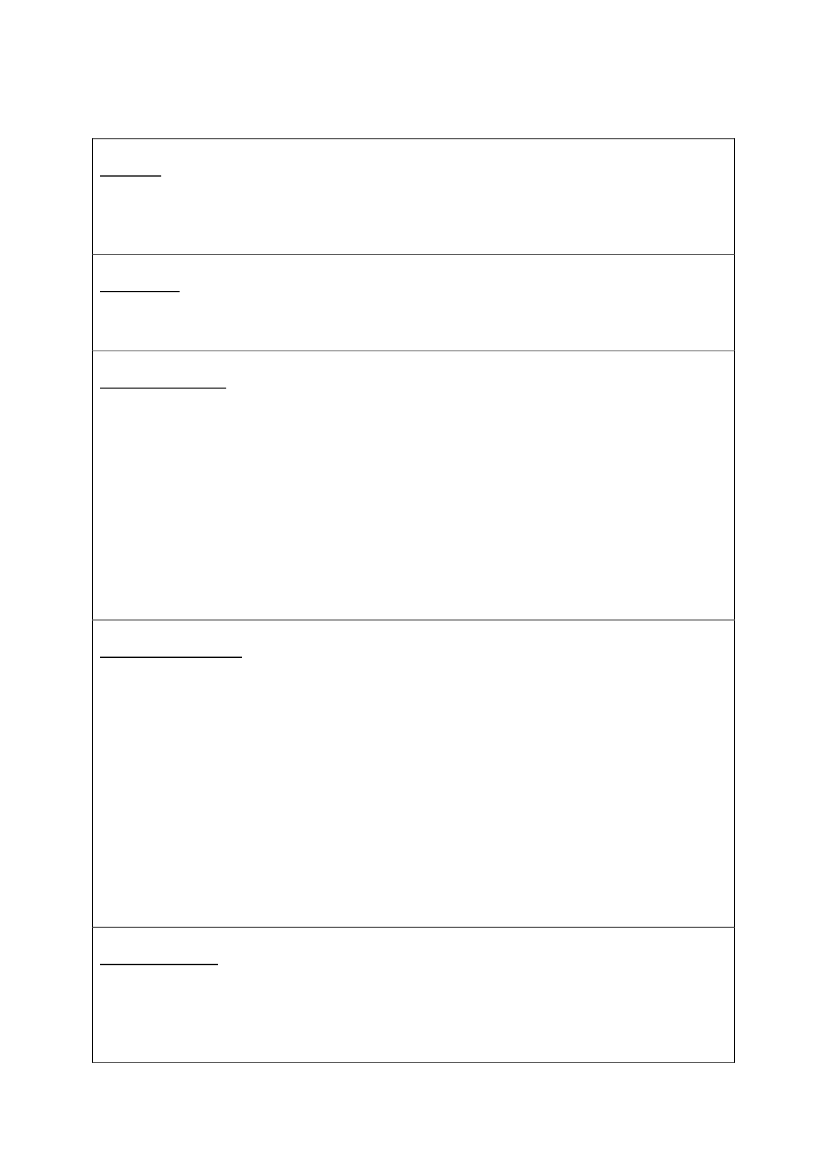Sundheds- og Forebyggelsesudvalget 2012-13
SUU Alm.del Bilag 109
Offentligt
Corporate crime in the pharmaceutical industry is common, serious and
repetitive
byPeter C. Gøtzsche, ProfessorMD, DrMedSci, MScNordic Cochrane CentreRigshospitalet, Dept. 7811CopenhagenE-mail: [email protected]14 Dec 2012
A short version of this article has been published in the BMJ:Gøtzsche PC. Big pharma often commits corporate crime, and this must be stopped.BMJ 2012;345:e8462
Abstract
Objectives:
To study whether large drug companies routinely break the law.Design:
Literature review, using Google searches combining the names of the tenlargest drug companies with "fraud."Results:
I found recent examples (2007 to 2012) of serious crimes committed byeach company. The crimes included marketing drugs for off-label uses,misrepresentation of research results, hiding data on harms, and Medicaid andMedicare fraud. Doctors were often complicit in the crimes, as kickbacks werecommon. The crimes were repetitive.Conclusions:
The crimes persist because crime pays. Harder sanctions arethereforee needed, including prison sentences for CEOs and other seniorexecutives. Doctors and their organisations should consider carefully whether theyfind it ethically acceptable to receive money that may have been partly been earnedby crimes that are harmful to patients.Conflicts of interest:
none.Funding:
none.1
In recent years, numerous articles and books have described serious cases ofresearch misconduct and marketing fraud committed by drug companies.1-9When acompany has been caught, the standard response from the drug industry is thatthere are a few bad apples in any enterprise. The interesting question is whether weare seeing a lone bad apple now and then, which might be excusable, or whether thecompanies routinely break the law.Methods
I did ten Google searches on 19 June 2012 combining the names of the ten largestdrug companies as of March 201010with "fraud." There were between 0.5 and 27million hits for each company and I selected the most prominent case described inthe ten hits on the first Google page. To ensure that the information I found wastrustworthy, I supplied or substituted it using more reliable sources in three cases.Results
The ten cases I selected were recent ones, from 2007 to 2012, and were all relatedto the United States11-20The most common criminal offences were illegal marketingrecommending drugs for non-approved (off-label) uses, misrepresentation ofresearch results, hiding data on harms, and Medicaid and Medicare fraud. I describethe cases in descending order according to the size of the company.101. Pfizer agreed to pay $2.3 billion in 200911This was the largest healthcare fraud settlement in the history of the US Departmentof Justice at the time. A subsidiary of the firm pleaded guilty to misbranding drugs"with the intent to defraud or mislead," and the firm was found to have illegallypromoted four drugs for uses which had not been approved by the drug regulators:Bextra (valdecoxib, an anti-arthritis drug), Geodon (ziprasidone, an antipsychoticdrug), Zyvox (linezolid, an antibiotic) and Lyrica (pregabalin, an epilepsy drug). Partof the fine ($1 billion) was levied to resolve the allegations that Pfizer paid bribes andoffered lavish hospitality to healthcare providers to encourage them to prescribe thefour drugs. Six whistleblowers would receive $102 million of the civil fines. Pfizerwould have to enter a Corporate Integrity Agreement with the Department of Healthand Human Services (which means that good behavior is required for the next fiveyears).2. Novartis agreed to pay $423 million in 201012The payment concerned criminal and civil liability arising from the illegal marketing ofTrileptal (oxcarbazepine, an epilepsy drug approved for the treatment of partialseizures, but not for any psychiatric, pain or other uses). The company unlawfullymarketed Trileptal and five other drugs causing false claims to be submitted togovernment health care programs. The agreement resolved allegations that thecompany paid kickbacks to health care professionals to induce them to prescribeTrileptal and five other drugs, Diovan (valsartan, for hypertension), Zelnorm(tegaserod, a drug for irritable bowel syndrome and constipation, which wasremoved from the market by US Food and Drug Administration (FDA) in 2007because of cardiovascular toxicity), Sandostatin (octreotide, a drug that mimics anatural hormone), Exforge (amlodipine + valsartan, for hypertension) and Tekturna(aliskiren, for hypertension). The whistleblowers, all former employees of Novartis,would receive payments totaling more than $25 million. Novartis signed a CorporateIntegrity Agreement.
2
3. Sanofi-Aventis to pay more than $95 million to settle fraud charge in 200913,21According to the settlement, Aventis had overcharged US and local health agenciesfor medications destined for indigent patients. The Justice Department said theywould ensure that programs for the most vulnerable portions of the population didnot pay any more for pharmaceutical products than they should under the law.Aventis acknowledged that it misreported drug prices for patients in the MedicaidDrug Rebate program for poor patients. The firm deliberately misquoted the prices,underpaying rebates to Medicaid and overcharging some public health agencies forthe medications. The fraud occurred between 1995 and 2000 and concerned steroid-based nasal sprays containing triamcinolone, Azmacort, Nasacort and Nasacort AQ.4. GlaxoSmithKline to pay $3 billion in 201114,22,23This is the largest healthcare fraud settlement in US history. GlaxoSmithKlinepleaded guilty to having marketed a number of drugs illegally for off-label use,including Wellbutrin (bupropion, an antidepressant), Paxil (paroxetine, anantidepressant), Advair (fluticasone + salmeterol, an asthma drug), Avandia(rosiglitazone, a diabetes drug), and Lamictal (lamotrigine, an epilepsy drug). Thecompany paid kickbacks to doctors, failed to include certain safety data aboutrosiglitazone in reports to the FDA, and sponsored programs suggestingcardiovascular benefits from Avandia despite warnings on the FDA-approved labelregarding cardiovascular risks. Allegations of Medicaid fraud by misreported priceswere also covered by the agreement. The whistleblowers were four employees ofGlaxoSmithKline, including a former senior marketing development manager and aregional vice president. The company entered into a Corporate Integrity Agreement.5. AstraZeneca to pay $520 million in 2010 to settle fraud case15The charges were that AstraZeneca illegally marketed one of its best-selling drugs,the antipsychotic drug Seroquel (quetiapine), to children, the elderly, veterans andinmates for uses not approved by the FDA, including aggression, Alzheimer's, angermanagement, anxiety, attention-deficit hyperactivity disorder, dementia, depression,mood disorder, post-traumatic stress disorder and sleeplessness. Further, thecompany targeted its illegal marketing towards doctors who do not typically treatpsychotic patients and payed kickbacks to some of them. Other doctors were sent tolavish resorts to encourage them to market and prescribe the drugs for unapproveduses. The whistleblower would get more than $45 million.6. Roche convinces governments to stockpile Tamiflu16,24-26In preparation for the mild 2009 influenza epidemic, the US government spent $1.5billion and the European governments billions of Euros on the purchase of Tamiflu(oseltamivir).16,24Based on unpublished trials, Roche had claimed that Tamiflureduced hospital admissions by 61%, secondary complications by 67%, and loweredrespiratory tract infections requiring antibiotics by 55%.24Roche had omittedpublishing most of their clinical trial data and refused to share them with independentCochrane researchers. The company had convinced the European MedicinesAgency (EMA) to approve the drug for prevention of influenza complications,26whereas the FDA required Roche to print a disclaimer to the contrary on the lables:"Tamiflu has not been proven to have a positive impact on the potentialconsequences (such as hospitalizations, mortality, or economic impact) of seasonal,avian, or pandemic influenza". There is no convincing evidence either that Tamiflu
3
prevents influenza complications or reduces the spread of influenza to otherpeople.24-26Guidance from the WHO had concealed that the authors had receivedpayment from Roche,16and Roche also used ghostwriters. One of them said: "TheTamiflu accounts had a list of key messages that you had to get in. It was run by themarketing department and you were answerable to them."24Tamiflu reduces theduration of influenza by 21 hours,25which can probably be obtained with far cheaperdrugs like aspirin and paracetamol. Furthermore, Tamiflu has important harms, butthey were concealed to such an extent that the Cochrane researchers could notreport on them.7. Johnson & Johnson fined more than $1.1 billion in 201217A jury found that the company and its subsidiary Janssen had downplayed andhidden risks associated with the antipsychotic drug Risperdal (risperidone). Thejudge found nearly 240,000 violations under Arkansas' Medicaid-fraud law. Jurorsreturned a quick verdict in favour of the state, which had argued that Janssen liedabout the potentially life-threatening side effects of Risperdal which, like similarantipsychotic drugs, include death, strokes, seizures, weight gain and diabetes. TheFDA had ordered Janssen to issue a letter to doctors correcting an earlier lettersaying the drug didn't increase the risk of developing diabetes. Janssen continued tomaintain after the verdict that it did not break the law. Previous verdicts against thecompany a few months earlier included a $327 million civil penalty in South Carolinaand a $158 million settlement in Texas.8. Merck to pay $670 million over Medicaid fraud in 200718Merck had failed to pay the appropriate rebates to Medicaid and other govermenthealth care programs, and had also paid kickbacks to doctors and hospitals toinduce them to prescribe various drugs. The allegations were brought in twoseparate lawsuits filed by whistleblowers; one of them would receive $68 million.From 1997-2001, Merck's sales force used approximately 15 different programs toinduce doctors to prescribe its drugs. These programs primarily consisted of excesspayments to doctors that were disguised as fees paid to them for “training,”“consultation” or “market research.” The government alleged that these fees wereillegal kickbacks intended to induce the purchase of Merck drugs. Merck agreed to aCorporate Integrity Agreement.9. Eli Lilly to pay more than $1.4 billion for illegal marketing in 200919Eli Lilly entered into a settlement with the Department of Justice concerning a wide-ranging, off-label marketing scheme for its top-selling antipsychotic drug, Zyprexa(olanzapine), with worldwide sales of nearly $40 billion between 1996 and 2009. Inthe settlement, Eli Lilly would pay $800 million in civil penalties and plead guilty tocriminal charges, paying an additional $600 million fine. The allegations were raisedby six whistleblowers from Lilly who would share in approximately 18 per cent of thefederal and qualifying states' recoveries. All six whistleblowers were eventually firedor forced to resign by the company. According to the Complaint, one salesrepresentative had contacted the company hotline regarding unethical salespractices but received no response.Eli Lilly successfully marketed Zyprexa for numerous off-label uses includingAlzheimer's, depression and dementia, particularly in children and the elderly,although the harms of the drug are substantial, inducing heart failure, pneumonia,
4
considerable weight gain and diabetes. Eli Lilly sales people were posed as personsin the audience who were interested in Zyprexa's expanded use and asked "plantedquestions" during off-label lectures and audio conferences for physicians. Anothertactic was that, while knowing the substantial risk for weight gain posed by Zyprexa,the company minimized the connection between Zyprexa and weight gain in a widelydisseminated videotape called "The Myth of Diabetes" that used "allegedly scientificstudies of questionable integrity as well as the haphazard reporting of adverseevents." The settlement agreement included a Corporate Integrity Agreement.10. Abbott to pay $1.5 billion for Medicaid fraud in 201220Abbott settled allegations of Medicaid fraud for the company’s illegal marketing of theepilepsy drug Depakote (valproate); part of the settlement would be paid to thewhistleblowers. Abbott would pay $800 million in civil damages and penalties tocompensate Medicaid, Medicare, and various federal healthcare programs for harmsuffered as a result of its conduct. Abbott also pled guilty to a violation of the Food,Drug, and Cosmetic Act and agreed to pay a criminal fine and forfeiture of $700million.The states alleged that Abbott promoted the sale and use of Depakote foruses that were not approved by the FDA as safe and effective; that AbbottLaboratories made false and misleading statements about the safety, efficacy,dosing and cost-effectiveness of Depakote for some unapproved uses; improperlymarketed the product in nursing homes; and paid kickbacks to induce doctors andothers to prescribe or promote the drug. Abbott entered into a Corporate IntegrityAgreement.Discussion
Even though my search strategy was simple, it was very easy to find recentexamples of serious crimes and other misdeeds committed by each of the ten largestdrug companies. It was also easy to find additional crimes committed by the sameten companies (see selected cases in table 1)27-38Six of these cases appeared onthe first Google page in the original search, one on a subsequent page, and threewere found using "crime" instead of "fraud." Sometimes many crimes were listed inthe first ten hits in the original search and an example is shown in table 2 forGlaxoSmithKline.39-43I decideda priorito use "fraud" as my search word, but I couldalso have used "criminal," "illegal," "FBI," "kickback," "misconduct," "settlement,""bribery," "guilty" and "felony," for example, which would have revealed manyadditional, recent crimes. It was also easy to find crimes committed by the drugcompanies outside the United States.Thus, there can be no doubt that the crimes are widespread and repetitive,which suggests they are committed deliberately. The obvious reason is that crimepays, and a well-researched example is Neurontin (gabapentin) (table 1). Warner-Lambert, later bought by Pfizer, paid doctors to allow sales people to sit with them asthey saw patients and to suggest using gabapentin to patients with a wide array ofailments, including bipolar disorder, pain, migraine headaches, and drug and alcoholwithdrawal,27although the drug was only approved for treatment-resistantepilepsy.2,8,44At some Neurontin meetings, the company paid not only the speakersbut also the listeners, treating them to luxury trips to Hawaii, Florida or the 1996Olympics in Atlanta27and a physician-whistleblower has testified that he was trainedto distort the scientific evidence.8Of 40 influential thought leaders identified aspotential speakers in Northeastern USA, 35 participated in company-sponsored
5
activities, and 14 requested or were allocated $10,250 to $158,250 in honoraria orgrants.45One doctor received almost $308,000 to tout Neurontin at conferences.27The speakers were updated on the company's promotional strategies,45and Warner-Lambert tracked high-volume prescribers and rewarded them as speakers orconsultants, or for recruiting patients in studies. Doctors were paid to lend theirnames to ghostwritten articles purporting to show that Neurontin worked forunapproved conditions.2,46Pfizer agreed in 2009 to pay $430 million to resolve criminal and civil charges,but as the sales of gabapentin were $2,700 million in 2003 alone, and as about 90%was for off-label use,27,44such fines are far too small to be expected to have anydeterrent effect. When Pfizer was fined $2.3 billion for off-label use of four otherdrugs,11part of the settlement with the Justice Department was that Pfizer entered aCorporate Integrity Agreement with the Department of Health and Human Servicesto avoid and detect such problems in future. Such agreements may have little teeth,as Pfizer had previously entered into three such agreements,47and Merck at leasttwo (table 1). As five of the ten companies had entered a Corporate IntegrityAgreement in relation to the ten first cases I selected, I looked the other fivecompanies up. Of the top 10 pharma companies, only Roche was not bound by suchan agreement in July 2012.48,49The companies' views of themselvesThe Pharmaceutical Research and Manufacturers of America (PhRMA) claims itsmembers are “committed to following the highest ethical standards as well as alllegal requirements.”50Its Code on Interactions with Healthcare Professionals51states that:"Ethical relationships with healthcare professionals are critical to our mission ofhelping patients … An important part of achieving this mission is ensuring thathealthcare professionals have the latest, most accurate information availableregarding prescription medicines.”The disconnect between the proclamations of “highest ethical standards” and thereality of big pharma’s conduct is vast. The ten largest companies are all signatoriesto the code, apart from Roche,51which was the largest corporate fraudster worldwidein the 1990's52(table 1). Further, the top executives' views of themselves are notshared by their employees. An internal survey of Pfizer employees showed thatabout 30% didn't agree with the statement, "Senior management demonstrateshonest, ethical behavior."9The public's views of the companiesThe general public has a more sober view of what the companies are doing. In anopinion poll that asked 5,000 Danes to rank 51 industries in terms of the confidencethey had in them, the drug industry came second to the bottom, only superseded byautomobile repair companies.53A US poll also ranked the drug industry at thebottom, together with oil and tobacco companies.54The consequences of the crimes are hugeIn relation to AstraZeneca's off-label marketing of its antipsychotic drug, Seroquel(quetiapine), described above,15the US Attorney General said:
6
"These were not victimless crimes - illegal acts by pharmaceutical companies andfalse claims against Medicare and Medicaid can put the public health at risk, corruptmedical decisions by health care providers, and take billions of dollars directly out oftaxpayers' pockets."Doctors are complicit in the crimes when they accept kickbacks and engage in othertypes of corruption, often in relation to illegal marketing. When drugs are marketed tonon-approved uses, we don't know whether they are effective, and they could alsobe more harmful, e.g. if used in children. This practice has therefore been describedas using the citizens as guinea pigs on a large scale without their informedconsent.27Even when doctors use drugs only for approved indications, the crimes haveconsequences for the patients. Doctors only have access to selected andmanipulated information,1-9,43and they therefore believe drugs are far more effectiveand safe than they really are. Thus, both legal and illegal marketing leads to massiveovertreatment of the population and a lot of harm that could have been avoided.As many of the crimes I identified were related to psychiatry, I shall use thisspecialty as an example. Psychiatry is a lucrative area for the industry, as mostdefinitions of psychiatric disorders are vague and easy to manipulate. In Minnesota,psychiatrists collected more money from drug makers from 2000 to 2005 thandoctors in any other specialty, and those who took most money tended to prescribeatypical antipsychotics to children most often.55In Denmark, the sales of selectiveserotonin reuptake inhibitors (SSRIs) are now so high that 7% of the entirepopulation could be in treatment with an adult dose every day.56Obviously, suchmassive use of drugs that affect the brain cannot be healthy,5and it is clear that thedrug companies have caused this overtreatment. From 1992, the sales of SSRIsincreased almost linearly by a factor of 18, which was closely related (r = 0.97) to thenumber of products on the market (and therefore the marketing pressure), whichincreased by a factor of 16.56The psychiatrists are aware of the problem. A 2007survey of 108 Danish psychiatrists showed that 51% felt they used too muchmedicine and only 4% felt they used too little.57In the United States it is even worse.The most sold class of drugs in 2009 (in dollars) was antipsychotics andantidepressants came fourth, after lipid lowering drugs and proton pump inhibitors.58It is hard to imagine that so many Americans can be so mentally disturbed that thesesales reflect genuine needs.What should be done?To tackle a problem effectively, we first need to describe and name it. In 2004-5, TheBritish House of Commons Health Committee examined the drug industry in detail59and found that its influence was enormous and out of control.60The drug industry isclearly playing hardball, running calculated risks and corrupting people on a largescale, which lead to the unnecessary loss of thousands of lives every year and greatcosts for our national economies.1-9,41,59,61I therefore believe that what we are seeing has similarities to organized crime.A previous global vice president of marketing at Pfizer turned whistleblower when thecompany wouldn't listen to his complaints about illegal marketing9holds a similarview:62"It is scary how many similarities there are between this industry and the mob. Themob makes obscene amounts of money, as does this industry. The side effects of
7
organized crime are killings and deaths, and the side effects are the same in thisindustry. The mob bribes politicians and others, and so does the drug industry …The difference is, all these people in the drug industry look upon themselves - well,I’d say 99 percent, anyway - look upon themselves as law-abiding citizens, not ascitizens who would ever rob a bank … However, when they get together as a groupand manage these corporations, something seems to happen … So there’ssomething that happens to otherwise good citizens when they are part of acorporation. It’s almost like when you have war atrocities; people do things they don’tthink they’re capable of. When you’re in a group, people can do things theyotherwise wouldn’t, because the group can validate what you’re doing as okay."I also suggest we view marketing of drugs as drug pushing. Between the two WorldWars, Hoffman-La Roche supplied morphine to the underworld, and othercompanies in the United Kingdom, Germany, Japan, Switzerland and the UnitedStates also participated in the trade with opium, morphine and heroin.61,63,64Pushingdrugs people don't need is a highly lucrative business. Valium (diazepam), anotherRoche product, was once the top-selling drug, many indications for its use werehighly doubtful, and the wholesale prize was 25 times the price of gold.61It tookmany years before it became accepted that tranquilizers are strongly addictive, butthe hard lessons were forgotten, as we now witness a similar explosion in dubiousindications for SSRIs, although these drugs are also addictive,5,59,65and forantipsychotics. The fact that some drugs affecting the brain are legal and others areillegal is not important, as the drugs are pushed in both cases. After havingexamined the drug industry in detail, John Braithwaite published a book in 1984where he said:61"People who foster dependence on illicit drugs such as heroin are regarded asamong the most unscrupulous pariahs of modern civilisation. In contrast, pushers oflicit drugs tend to be viewed as altruistically motivated purveyors of a social good."When a crime has led to the deaths of many people, we should view it as a crimeagainst humanity. Whether hundreds or thousands of people are killed for personalgains by arms or by pills should make no difference for our perception of themisdeed.We need much harder sanctions for the crimes. Even the large fines in theUnited States are insufficiently large. To deter bad behavior, they would need to beso large that the companies would risk going bankrupt, but unfortunately, this isunlikely to happen. The largest companies earn so much money to their homecountry that the governments wouldn't dare run such a risk. In 2010, the ten largestcompanies sold drugs for $303 billion,10which is more than the Gross NationalProduct for all but the richest 34 countries in the world.66US federal law requires thatany company found guilty of marketing fraud be automatically excluded fromMedicare and Medicaid, but government prosecutors decided that this exclusionwould lead to the collapse of “too big to fail” Pfizer.67To bring the crimes to light also outside the United States, we need laws thatprotect whistleblowers and ensure they get a fair proportion of the fines. It is curiousand unfortunate that very little happens to the offending companies outside theUnited States. When Merck had withdrawn rofecoxib (Vioxx) from the market in 2004after its marketing frauds68had caused tens of thousands of cardiovasculardeaths,69,70Pfizer Denmark grabbed the opportunity and wrote to the doctors that its
8
Cox-2 inhibitor, celecoxib, did not cause thrombosis.71The fine for this blatantmisinformation was a mere DKK 12,000 (about $2,000). Three months later, PfizerUS denied that celecoxib causes heart attacks at an FDA hearing FDA,72despitehaving unpublished evidence to the contrary.73Indeed, independent researcherswho had access to FDA data confirmed the cardiovascular harms of celecoxib.73Top executives should be held personally accountable for the crimes so thatthey would need to pay attention to the risk of going to prison when they considerperforming or acquiescing in crimes. Merck produced a pamphlet to its sales force in2001 indicating that rofecoxib was associated with 1/8 the mortality fromcardiovascular causes of that found with other nonsteroidal, anti-inflammatorydrugs.74This wasafterthe FDA had raised concerns about a five-fold increase inmyocardial infarction in a pivotal trial of rofecoxib! Even so, the same year Merckpulled rofecoxib off the market, its CEO received performance-based bonuses worthover $36 million in addition to his base salary75and he was never indicted. Thiscomplacency with even lethal crimes may be about to change in the USA. In 2010,the Justice Department charged a former vice president for GlaxoSmithKline (seetable 2).We need to avoid the situation that, by settling accusations of crimes, the drugcompanies can pretend they are innocent, claiming that they have not beenconvicted of a crime. AstraZeneca, for example, denied the charges of fraudulentmarketing and its general counsel said that moving forward and resolving the casewas "in the best interest" of the company.15And although part of the civil settlementwith GlaxoSmithKline included claims that the company overcharged the USgovernment for drugs, GlaxoSmithKline did not admit any wrongdoing.23We also need laws requiring firms to disclose all knowledge about their drugsand research data,43and that not only allows, but requires drug agencies to publishwhat they know. Currently, the companies may not disclose anything even whenthey know that their drugs are more harmful than originally thought. In 2004, theWHO sent GlaxoSmithKline an alert about cardiac events caused by rosiglitazone,and the company performed a meta-analysis that confirmed it, which it sent to theFDA and the European Medicines Agency in 2006, but the drug regulatory agenciesdid not make the findings public because of the proprietary nature of companies’ trialresults.76This is an absurd interpretation of ownership to data and results, which isuntenable,43and it allows the companies to "push the drug aggressively and hopethey can make a billion dollars before someone finds out," as former editor of theNew England Journal of Medicine, Jerome Kassirer, expressed it.15A standard response from the drug industry to crimes is that the activitiesrevealed in recent settlements or verdicts occurred many years ago, and practiceshave changed radically since then.23That may be true but not in the way the drugindustry wants us to believe, as the crimes seem to beincreasing.Three-quarters ofthe 165 settlements comprising $19.8 billion in penalties during the 20-year intervalfrom 1991 to 2010 occurred in just the past five years of that period.77Doctors and their organisations should consider carefully whether they find itethically acceptable to receive money that may have been partly earned by crimesthat have harmed those people whose interests doctors are expected to take care of.Many crimes would be impossible to carry out, if doctors weren't willing to participatein them.
9
References
1. Abramson J. Overdo$ed America: The broken promise of American medicine. New York:Harper Collins, 2004.2. Angell M. The truth about the drug companies: How they deceive us and what to do aboutit. New York: Random House, 2004.3. Avorn J. Powerful medicines: The benefits, risks, and costs of prescription drugs. NewYork: Vintage Books, 2005.4. Brody H. Hooked: ethics, the medical profession, and the pharmaceutical industry.Lanham: Rowman & Littlefield, 2008.5. Healy D. Let them eat Prozac. New York: New York University Press, 2004.6. Kassirer JP. On the take: how medicine's complicity with big business can endanger yourhealth. Oxford: Oxford University Press, 2005.7. Mundy A. Dispensing with the truth. New York: St. Martin's Press, 2001.8. Petersen M. Our daily meds. New York: Sarah Crichton Books, 2008.9. Rost P. The whistleblower: confessions of a healthcare hitman. New York: Soft SkullPress, 2006.10. Reuters. Factbox - The 20 largest pharmaceutical companies. 2010; Mar 26.11. BBC News. Pfizer agrees record fraud fine. 2009; Sept 2.12. United States Department of Justice. Novartis Pharmaceuticals Corp. to pay more than$420 million to resolve off-label promotion and kickback allegations. 2010; Sept 30.13. SourceWatch. Sanofi-Aventis. 2011; Jan 23.14. Rabiner S. Glaxo $3B fine largest healthcare fraud settlement in history? FindLaw 2011;Nov 10.15. Khan H, Thomas P. Drug giant AstraZeneca to pay $520 million to settle fraud case.ABC News 2010; April 27.16. Cohen D, Carter P. WHO and the pandemic flu "conspiracies." BMJ 2010; 340:1274-9.17. CBS/AP. Ark. judge fines Johnson & Johnson more than $1.1B in Risperdal case. 2012;April 11.18. Silverman E. Merck to pay $670 million over Medicaid fraud. Pharmalot 2008; Feb 7.19. Reuters. The largest pharma fraud whistleblower case in U.S. history totaling $1.4 billion.2009; Jan 15.20. Anonymous. Abbott Labs to pay $1.5 billion more for Medicaid fraud. 2012; May 8.http://somd.com/news/headlines/2012/15451.shtml (accessed 19 June 2012).10
21. AFP. Aventis to pay $95 million to settle fraud charge. 2009; May 28.22. Department of Justice. GlaxoSmithKline to plead guilty and pay $3 billion to resolve fraudallegations and failure to report safety data. 2012; July 2.23. Thomas K, Schmidt MS. Glaxo agrees to pay $3 billion in fraud settlement. New YorkTimes 2012; July 2.24. Cohen D. Complications: tracking down the data on oseltamivir. BMJ 2009;339:b5387.25. Jefferson T, Jones MA, Doshi P, Del Mar CB, Heneghan CJ, Hama R, Thompson MJ.Neuraminidase inhibitors for preventing and treating influenza in healthy adults and children.Cochrane Database Syst Rev 2012;1:CD008965.26. Cohen D. Search for evidence goes on. BMJ 2012;344:e458.27. Tansey B. Huge penalty in drug fraud / Pfizer settles felony case in Neurontin off-labelpromotion. San Francisco Chronicle 2004; May 14.28. Silverman E. Novartis pays $150m to settle pricing fraud. Pharmalot 2011; 18 Nov.29. Barnes K. Sanofi slammed by FDA over failure to act on Ketek fraud. Outsourcing 2007;Oct 25.30. More fraud from drug giant GlaxoSmithKline companies - court documents show. ChildHealth Safety 2010; 1 Dec.31. Jureidini JN, McHenry LB, Mansfield PR. Clinical trials and drug promotion: Selectivereporting of study 329. International Journal of Risk & Safety in Medicine 2008;20:73-81.32. Barboza D. Tearing down the facade of 'Vitamins Inc.' New York Times 1999; Oct 10.33. Russell J. Johnson & Johnson feels pain of $75m bribery fines. The Telegraph 2011; 9April.34. Kelton E. J&J needs a cure: new CEO allegedly had links to fraud. Forbes 2012; 17April.35. U.S. Department of Justice. U.S. pharmaceutical company Merck Sharp & Dohmesentenced in connection with unlawful promotion of Vioxx. The FBI Federal Bureau ofInvestigation 2012; April 19.36. Pringle E. Eli Lilly hides data: Zyprexa, Evista, Prozac risk. Conspiracy Planet.http://www.conspiracyplanet.com/channel.cfm?channelid=55&contentid=4181&page=2(accessed 28 June 2012).37. Clinard MB, Yeager PC. Corporate crime. New Brunswick: Transaction Publishers, 2006.38. Harris G. As doctors write prescriptions, drug company writes a check. New York Times2004; June 27.39. Wilson D. Ex-Glaxo executive is charged in drug fraud. New York Times 2010; 9 Nov.40. Lane C. Bad medicine: GlaxoSmithKline's fraud and gross negligence. PsychologyToday 2011; 7 Jan.
11
41. Silverman E. Glaxo to pay $750M for manufacturing fraud. Pharmalot 2010; 26 Oct.42. GlaxoSmithKline. Wikipedia 2012; 20 June.43. Gøtzsche PC. Why we need easy access to all data from all clinical trials and how toaccomplish it. Trials 2011;12(1):249.44. Harris G. Pfizer to pay $430 million over promoting drug to doctors. New York Times2004; May 14: p.1 and 6.45. Steinman MA, Bero LA, Chren MM, Landefeld CS. Narrative review: the promotion ofgabapentin: an analysis of internal industry documents. Ann Intern Med 2006; 145(4):284-93.46. Petersen M. Suit says company promoted drug in exam rooms. New York Times 2002;May 15.47. Tanne JH. Pfizer pays record fine for off-label promotion of four drugs. BMJ 2009;339:b3657.48. Office of Inspector General. U.S. Department of Health and Human Services. CorporateIntegrity Agreement Documents. 2012; 22 June.49. Comer B. Comply or die: Introducing GSK's new corporate integrity agreement.PharmExecBlog 2012; July 6.50. Kelton E. More drug companies to pay billions for fraud, join the "dishonor roll" afterAbbott settlement. Forbes 2012; May 10.51. PhRMA Code on Interactions with Healthcare Professionals – Signatory Companies.http://www.phrma.org/sites/default/files/108/signatory_companies_phrma_code_061112.pdf(accessed 25 June 2012).52. Multinational Monitor. Corporate crime in the '90s: the top 100 corporate criminals of the1990s. 1999 July/August vol 20: no 7 & 8.53. Straarup B. God behanding - så er hoteller nr. 1. Berlingske Tidende 2005; 25 Nov.54. Harris G. Drug makers seek to mend their fractures image. New York times 2004; July 855. Harris G, Carey B, Roberts J. Psychiatrists, children and drug industry’s role. New YorkTimes 2007; May 10.56. Nielsen M, Gøtzsche P. An analysis of psychotropic drug sales. Increasing sales ofselective serotonin reuptake inhibitors are closely related to number of products. Int J RiskSaf Med 2011;23(2):125-32.57. Arbejdsmiljø og behandlingsformer i den danske psykiatri. Nordjyske Medier, 2007.58. Press release: IMS Health reports U.S. prescription sales grew 5.1 percent in 2009, to$300.3 billion. IMS Health 2010; April 1.59. House of Commons Health Committee. The influence of the pharmaceutical industry.Fourth Report of Session 2004–05.
12
60. Collier J. Big pharma and the UK government. Lancet 2006;367:97-8.61. Braithwaite J. Corporate crime in the pharmaceutical industry. London: Routledge &Kegan Paul, 1984.62. Rost P. http://peterrost.blogspot.dk/ (accessed 26 June 2012).63. Bobst EH. Bobst: The autobiography of a pharmaceutical pioneer. New York: DavidMcKay Company, 1973.64. Bruun K. International drug control and the pharmaceutical industry. In: Cooperstock R,ed. Social aspects of the medical use of psychotropic drugs. Addiction ResearchFoundation, Ontario, Canada. Papers presented at the International Symposium on Alcoholand Drug Research, 1973. Department of National Health and Welfare, 1974.65. Nielsen M, Hansen EH, Gøtzsche PC. What is the difference between dependence andwithdrawal reactions? A comparison of benzodiazepines and selective serotonin re-uptakeinhibitors. Addiction 2012;107(5):900-8.66. List of countries by GDP (nominal). Wikipedia. 2012; 30 June.67. Annas GJ. Corporations, profits, and public health. Lancet 2010;376:583-4.68. Tanne JH. Merck appeals rofecoxib verdict. BMJ 2007;334:607.69. Topol EJ. Failing the public health - rofecoxib, Merck, and the FDA. N Engl J Med2004;351:1707-9.70. Lenzer J. FDA is incapable of protecting US "against another Vioxx". BMJ2004;329:1253.71. Crone M. Pfizer får ny bøde for ulovlig markedsføring. Berlingske 2004; 16 Nov.72. Harris G. Pfizer says internal studies show no Celebrex risks. New York Times 2005, 5Febr.73. Caldwell B, Aldington S, Weatherall M, Shirtcliffe P, Beasley R. Risk of cardiovascularevents and celecoxib: a systematic review and meta-analysis. J R Soc Med 2006;99(3):132-40.74. Waxman HA. The lessons of Vioxx - drug safety and sales. N Engl J Med2005;352:2576-8.75. Whelton RS. Effects of excessive CEO pay on U.S. society.http://www.svsu.edu/emplibrary/Whelton%20article.pdf (accessed 6 Nov 2007).76. Cohen D. Rosiglitazone: What went wrong? BMJ 2010;341:530-4.77. Almashat S, Preston C, Waterman T, Wolfe S; Public Citizen’s Health Research Group.Rapidly increasing criminal and civil monetary penalties against the pharmaceutical industry:1991 to 2010. 2010; December 16.http://www.citizen.org/documents/rapidlyincreasingcriminalandcivilpenalties.pdf (accessed 4July 2012)
13
Table 1. Selected additional crimes for each of the ten largest drug companies
1. Pfizer. Agreed to plead guilty in 2004 to two felonies and pay $430 million inpenalties to settle charges that it fraudulently promoted Neurontin (gabapentin) forunapproved uses.27A company whistleblower would receive $27 million. See alsomain text.
2. Novartis. Agreed to pay $150 million in 2001 to settle lawsuits filed by the states ofFlorida and California, as well as a whistleblower, to settle charges that it deliberatelymisreported pricing information in order to hike reimbursements from Medicaid.28
3. Sanofi-Aventis. In 2007, the FDA slammed Sanofi-Aventis over its failure to act onknown instances of fraud during a pivotal clinical trial of its antibiotic Ketek(telithromycin).29The firm continued to deny the accusations, although one of theinvestigators had been convicted of fraud over the enrolment of patients and fakingconsent forms and was sentenced to 57 months in prison. During a review byCongress, a former employee said that the company was aware of fraudulent databut didn't take any action. The imprisoned investigator had enrolled over 400patients, at a pay of $400 per patient, whereas another site had enrolled just 12. Inaddition, no patients had withdrawn from the study or were lost to follow up, which isalso highly suspicious given the number of patients. Ketek is still available in theUSA, but carries a black box warning, as it can cause liver failure, and it is no longerapproved for less serious illness.
4. GlaxoSmithKline. In 1999, US psychiatrists Charles Nemeroff and AlanSchatzberg published a drug pushing psychiatry textbook that was ghostwritten byGlaxoSmithKline (GSK).30The company withheld scientific studies showing thatPaxil (paroxetine) was ineffective in children and adolescents with depression,30butin 2001, GSK published a ghostwritten study, trial 329, which became widely citedand believed. In 2004, the Attorney General of New York State sued GSK forrepeated and persistent consumer fraud, which opened the company's archives.GSK lied to its sales force telling them that trial 329 showed "REMARKABLE Efficacyand Safety."31In internal documents, the company admitted that the study didn'tshow Paxil was effective, but after extensive data manipulations, the published paperreported positive effects.31Eight children became suicidal on the drug versus one onplacebo. The publication, however, listed only one headache as being related to thedrug, and the suicidal thoughts and behaviour were called emotional lability orhospitalisation.
5. AstraZeneca. Paid $355 million in 2003 after pleading guilty to charges that itencouraged physicians to illegally request Medicare reimbursements for its drugagainst prostate cancer, Zoladex (goserelin), and bribed doctors to buy it.15
14
6. Roche. High-level executives in Roche led a cartel that, according to the USJustice Department's antitrust division, was the most pervasive and harmful criminalantitrust conspiracy ever uncovered.32For a full decade, top executives at some ofthe world's largest drug companies, largely from Europe and Asia, met secretly inhotel suites and at conferences, and working together in a coalition they brazenlycalled 'Vitamins Inc.,' they carved up world markets and carefully orchestrated priceincreases, in the process defrauding some of the world's biggest food companies.Roche alone had revenues of $3.3 billion in the United States while the conspiracywas running, and during that time, Justice Department investigators say theconspirators gradually and artfully raised the prices of raw vitamins, so as not toattract notice; they also rigged the bidding process. After the conspiracy collapsed,those involved agreed to pay nearly $1 billion to settle Federal antitrust charges, andvirtually every big vitamin maker in the world was on the brink of agreeing to pay anadditional $1.1 billion. Roche was hit the hardest, agreeing to pay $500 million tosettle charges, equivalent to about one year's revenue from its vitamin business inthe United States. Two Roche executives were sentenced by Federal courts toprison terms of a few months. Roche had gone this route before. In the early 1970's,it was fined by antitrust officials in Europe for engaging in anticompetitive behaviourin the sale of its two tranquilizers, Librium (chlordiazepoxide) and Valium (diazepam).
7. Johnson & Johnson. Was to pay more than $75m to UK and US authorities in2009 to settle corruption charges spanning three European countries and Iraq.33Thecharges related to alleged payment of bribes to doctors in Greece, Poland andRomania to encourage them to use the company's products and to hospitaladministrators in Poland to award the company contracts. In April 2012, the USGovernment stated in a motion in a potential multi-billion healthcare fraud caseagainst Johnson & Johnson, which began with a whistleblower lawsuit, that AlexGorsky, who was set to become Johnson & Johnson’s next chief executive officer,was actively involved and had firsthand knowledge of the alleged fraud.34Theallegations were that Johnson & Johnson paid kickbacks to induce Omnicare, thenation’s largest nursing home pharmacy, to purchase and recommend theantipsychotic drug, Risperdal (risperidone) and other of the company's drugs. Thegovernment’s motion stated that Gorsky, being Vice President of Marketing, was in aposition to know why the company chose not to inform Omnicare or members ofJanssen’s sales staff that the FDA had warned the company that marketingRisperdal as safe and effective in the elderly would be false and misleading becausethe drug had not been adequately studied in that population, and that the FDA hadrejected the company's attempt to get approval to market Risperdal for treatment ofpsychotic and behavioral disturbances in dementia (by far the most prevalent use ofRisperdal in Omnicare-served nursing facilities) because of inadequate safety data.Despite the weight of federal and state investigations of the Risperdal allegations,Johnson & Johnson’s board of directors rewarded Gorsky by selecting him to be thenext CEO.
15
8. Merck. Pleaded guilty in 2012 to a criminal violation of federal law related to itspromotion and marketing of the anti-arthritis drug, Vioxx (rofecoxib), and to paynearly a billion dollars in a criminal fine and civil damages.35The crimes involved off-label marketing of Vioxx and false statements about the drug’s cardiovascular safety.As part of the settlement, Merck agreed to enter into an expansive CorporateIntegrity Agreement (Merck entered a similar agreement in 2007,18see main text).
9. Eli Lilly. Agreed to pay $36 million in 2005 to settle criminal and civil chargesrelated to the illegal marketing of Evista (raloxifene, a drug against osteoporosis) forthe prevention of breast cancer and heart disease in letters sales people sent todoctors.36The company had also concealed data that showed an increased risk ofovarian cancer. Eli Lilly entered into a Corporate Integrity Agreement. Eli Lilly'santidepressant, Prozac (fluoxetine), was promoted off-label for several ailments, e.g.shyness, eating disorders and low self esteem, and the company concealed theincreased risk of suicide and violence associated with the drug.5,36The BritishMedical Journal had received a series of internal Lilly documents and studies onProzac from an anonymous source, which the BMJ sent to the FDA. Thesedocuments were made available in a litigation case in 1994, after which theydisappeared. Throughout the 1990s, while swearing publicly that Prozac did notincrease the risk of suicide or violence, Lilly quietly settled lawsuits out of court andwas able to keep the incriminating evidence hidden by obtaining court orders to sealthe documents, just as it had been doing with Zyprexa until the latest batch ofdocuments was leaked to the press.3610. Abbott. In 2001, TAP Pharmaceuticals, a joint venture of Abbott and Takeda,paid $875 million, pleading guilty to criminal charges of fraud for inducing physiciansto bill the government for drugs that the company gave for free or at a reduced priceto doctors.2,37,38In 2003, Abbott paid $622 million to settle an investigation into salespractices for liquids to feed the seriously ill.37Abbott gave tubes and pumps todeliver the liquid food directly into the patient's digestive tracts in exchange for largeorders of the liquids.
16
Table 2. Some of the alleged crimes and other misdeeds identified in the first
ten hits of a Google search combining GlaxoSmithKline with fraud
In 2010, the Justice Department charged a former vice president and top lawyer forGlaxoSmithKline (GSK) with making false statements and obstructing a federalinvestigation into illegal marketing of the antidepressant Wellbutrin (bupropion) forweight loss.39The indictment accused the vice president of lying to the FDA, denyingthat doctors speaking at company events had promoted Wellbutrin for uses notapproved by the agency, and of withholding incriminating documents.A manufacturing plant in Puerto Rico was closed down in 2009 because it produceddefective drugs.40The plant had not only sent out batches of Paxil (paroxetine)containing two different doses, it had also mixed different drugs, e.g. Avandia(rosiglitazone) with Tagamet (cimetidine) and with Paxil. GSK pleaded guilty tofelony-fraud and was fined $750 million, $96 million of which would go to thewhistleblower, the company's global quality assurance manager, whose documentedconcerns were ignored by senior management that fired her.41GSK lied to federalinvestigators about the problems, despite pharmacists calling the plant directly whenpatients showed up with different coloured pills in their medicine. In pleading guilty tothe felony, GSK admitted that it had distributed adulterated drugs, but the companylied to the public when it indicated that it went voluntarily to the FDA in 2002 out ofsafety concerns about the plant and when it said that, 'The plant was closed in 2009due to a declining demand for the medicines made there.' Blockbusters such asAvandia, Paxil, and Tagamet could hardly be said to be in declining demand.In 2007, a meta-analysis showed that the antidiabetes drug Avandia (rosiglitazone)causes myocardial infarction and cardiovascular death.42,43This had been known byGSK for many years but the company failed to warn the regulatory authorities andthe public and intimidated physicians raising uncomfortable questions.43In 1999, thecompany, then known as SmithKlineBeecham, completed a trial that found morecardiac problems with rosiglitazone than with pioglitazone, but an executive stated inan email that, 'These data should not see the light of day to anyone outside of GSK.'When another GSK trial was published, it showed the same risk of complications forrosiglitazone as for the comparator, but this result was false.43An FDA scientist whohad access to the case reports found many missing cases of cardiac problems thatfavored rosiglitazone four to one and an increased risk of myocardial infarction.Rosiglitazone was suspended in Europe in 2009 whereas it remained on the marketin the USA.GSK marketed paroxetine in 1992 and falsely claimed for the next ten years that itwas 'not habit forming.'42In 2001, the BBC reported that the World HealthOrganization had found Paxil to have the hardest withdrawal problems of anyantidepressant drug. In 2002, the FDA published a warning about the drug, and theInternational Federation of Pharmaceutical Manufacturers Associations declared thecompany guilty of misleading the public about paroxetine on US television.In 2006, GSK would pay $14 million to resolve allegations that state-governmentprograms paid inflated prices for the firm’s anti-depressant drug Paxil because thefirm engaged in patent fraud, anti-trust violations and frivolous litigation to maintain a
17
monopoly and block generic versions from entering the market.42In 2003 GSK signed a Corporate Integrity Agreement and paid $88 million in a civilfine for overcharging Medicaid for Paxil, and the nasal-allergy spray Flonase(fluticasone).42In 2003, GSK faced a demand for $7.8 billion in backdated taxes and interest, thehighest in the history of the US Internal Revenue Service.42In 2006, GSK settled a tax dispute agreeing to pay $3.1 billion in a case thatconcerned intracompany 'transfer pricing.'42
18


















